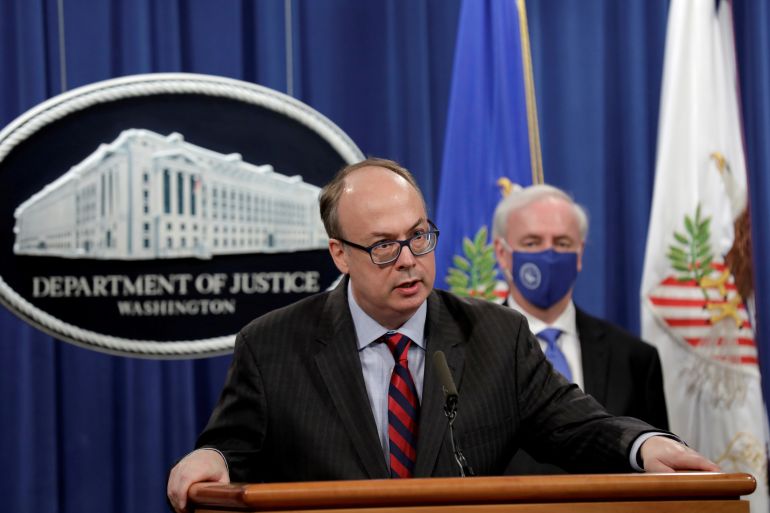Ex-US official declines to testify about election advice to Trump
Lawyer for Jeffrey Clark tells committee probing Capitol riot his client’s conversations with Trump are confidential.

A former top United States Justice Department official who aligned himself with Donald Trump after the 2020 presidential election has declined to testify before a House of Representatives panel investigating the deadly Capitol riot.
In a letter to the US House of Representatives Select Committee investigating the January 6 insurrection, the lawyer for Jeffrey Clark said his client’s conversations with Trump are confidential and privileged.
Keep reading
list of 3 itemsFacebook: ‘Ludicrous’ to say it fuelled US Capitol riot
Trump files lawsuit to block release of Capitol riot records
Clark championed Trump’s attempts to overturn the results of the November 4 election, which President Joe Biden won, and the committee is seeking to question him about allegations he had tried to help in that effort.
A former acting assistant US attorney general, Clark has come under scrutiny after several people said he encouraged Trump to oust former Acting Attorney General Jeffrey Rosen.
Rosen and others said Clark wanted to be installed himself, so he could launch investigations into Trump’s false election fraud claims.
“Mr. Clark is subject to a sacred trust,” Clark’s attorney, Harry MacDougald, wrote on Friday in a letter to US Representative Bennie Thompson, who chairs the House committee.
MacDougald said Clark’s advice to Trump is protected by executive privilege, a legal doctrine that keeps some White House communications confidential.
“Any attempts – whether by the House – or by the current President – to invade that sphere of confidentiality must be resisted,” he wrote, noting that Clark “cannot answer deposition questions at this time”.
In response, Thompson called Clark’s claim of privilege and refusal to answer questions unacceptable.
“He has a very short time to reconsider and cooperate fully. We need the information that he is withholding and we are willing to take strong measures to hold him accountable to meet his obligation,” he said in a statement.
Thompson had written in Clark’s subpoena that the committee’s probe “has revealed credible evidence that you attempted to involve the Department of Justice in efforts to interrupt the peaceful transfer of power” and his efforts “risked involving the Department of Justice in actions that lacked evidentiary foundation and threatened to subvert the rule of law”.
The committee has sought to compel several former Trump allies to testify in its ongoing probe, but some, including former adviser Steve Bannon, have declined.
On January 6, Trump gave a fiery speech in Washington, DC, to thousands of his supporters and urged them to march on the Capitol, where US legislators were meeting to certify Biden’s election victory.
He was later impeached for “incitement of insurrection” after a mob stormed the building.
The panel has interviewed more than 150 witnesses so far, two people familiar with the interviews told the Associated Press news agency on condition of anonymity because they were not authorised to discuss the process.
The interviews have included a broad swathe of former and current executive branch officials, Trump campaign aides, law enforcement officials and others. Several people who helped organise the rally in the morning of January 6 have also been interviewed.
Last month, Biden rejected an effort by Trump to prevent White House records of the deadly insurrection from being turned over. The former president had sought to invoke executive privilege, but White House spokeswoman Jen Psaki said that “was not warranted”.
“The president’s dedicated to ensuring that something like that could never happen again, which is why the administration is cooperating with ongoing investigations, including the January 6 Select Committee, to bring to light what happened,” Psaki told reporters on October 8.
“As a part of this process, the president has determined that an assertion of executive privilege is not warranted for the first set of documents from the Trump White House that have been provided to us by the National Archives.”
In sworn interviews to the Senate Judiciary Committee, Rosen and his former deputy Richard Donoghue told lawmakers that Clark met with Trump behind their backs and repeatedly pressured them to send letters to Georgia and other swing states, urging them to convene legislative sessions to contest the presidential election results.
Rosen and Donoghue refused Clark’s requests. Trump then considered ousting Rosen and installing Clark, but he was dissuaded after discovering that all of the Justice Department’s remaining assistant attorneys general would resign en masse if Clark were to be appointed.